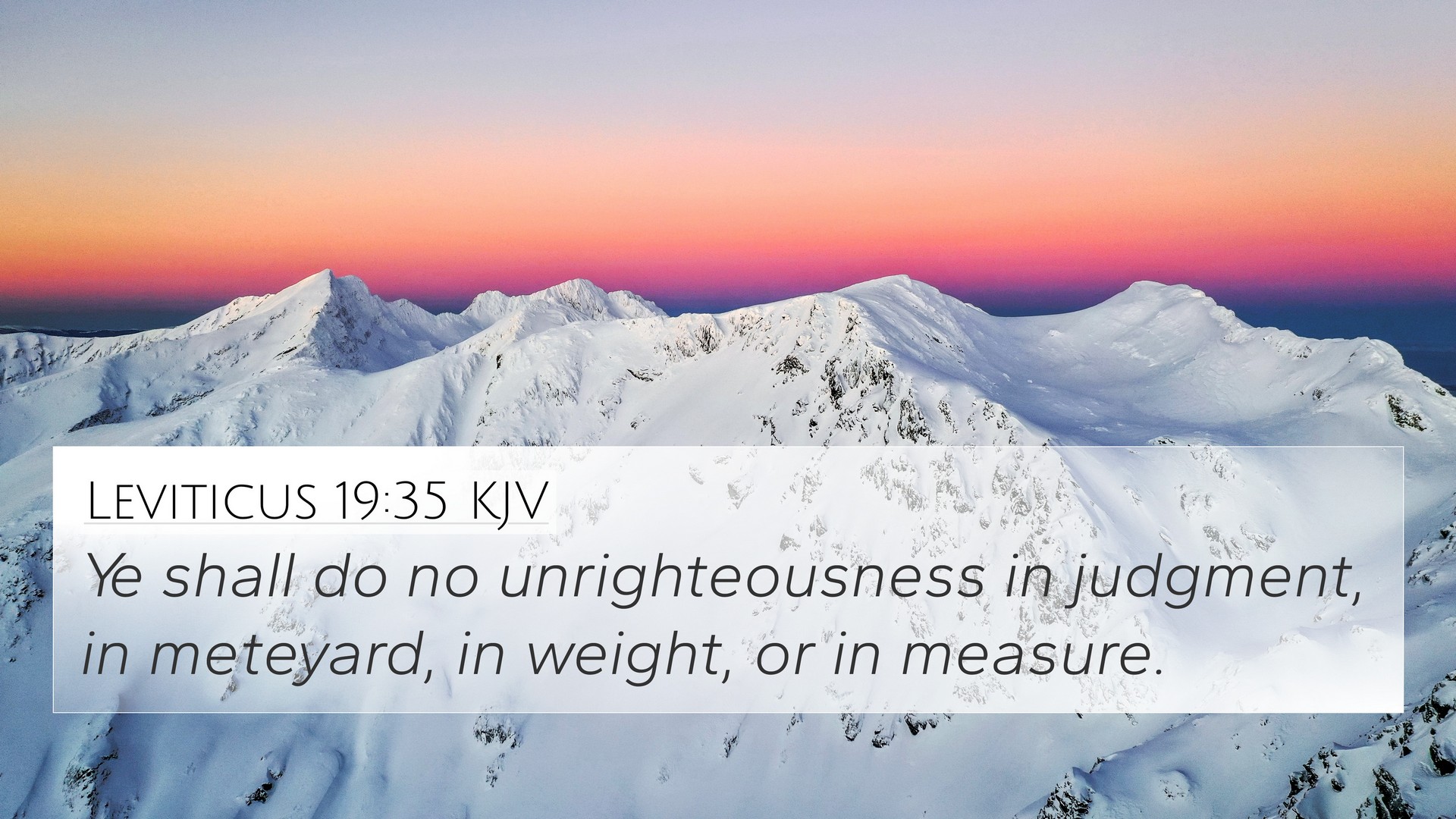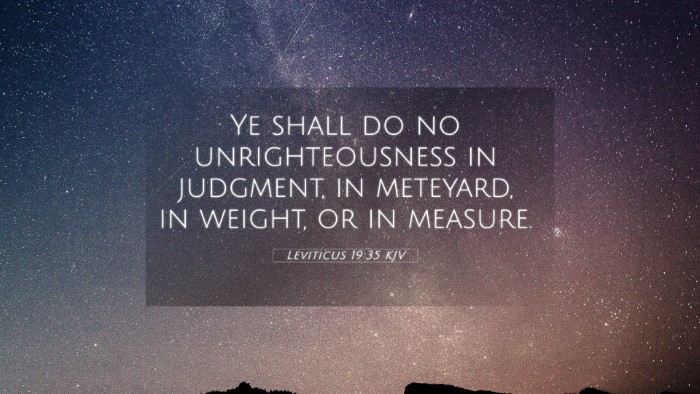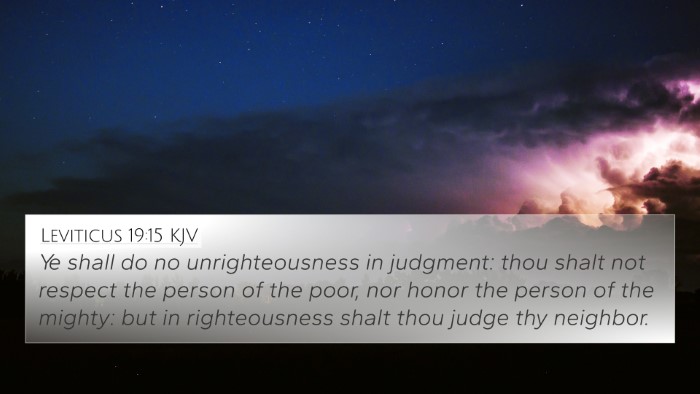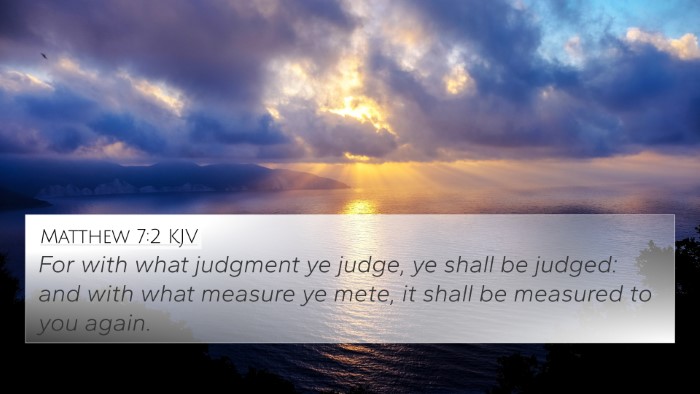Bible Verse Meaning: Leviticus 19:35
Verse Text: "You shall do no injustice in court. You shall not be partial to the poor or defer to the great, but in righteousness shall you judge your neighbor." (Leviticus 19:35, ESV)
Interpretation Overview
Leviticus 19:35 emphasizes the importance of justice and fairness in legal matters. This verse is part of a wider array of laws that God gives to Israel, focusing on ethical conduct in society. The commandment reflects God’s desire for His people to embody righteousness and integrity.
Combined Insights from Public Domain Commentaries
-
Matthew Henry:
Matthew Henry elucidates that the essence of this command is to promote equity, underscoring the notion that justice should not be swayed by external circumstances, such as a person's social status. Every individual, regardless of their wealth or poverty, should be treated with equal respect before the law.
-
Albert Barnes:
Barnes points out that the imperative against showing partiality is a fundamental principle in God’s law. He stresses that God desires His people to judge not on the basis of appearances but with an emphasis on truth and fairness. This instruction can be seen as a safeguard against corruption and favoritism within the judicial system.
-
Adam Clarke:
Clarke emphasizes the holistic nature of justice as portrayed in this text. He notes that God’s commands extend beyond mere legalities to encompass interpersonal relationships, urging individuals to judge their neighbors fairly without bias. Clarke insists that true justice reflects God's nature, serving as a marker of a righteous society.
Key Themes and Connections
The themes found in Leviticus 19:35 can be connected to various other Bible verses that discuss justice, impartiality, and the nature of God’s law. Here are some significant cross-references:
- Deuteronomy 16:19: "You shall not pervert justice; you shall not show partiality, and you shall not accept a bribe, for a bribe blinds the eyes of the wise and subverts the cause of the righteous."
- Proverbs 18:5: "It is not good to be partial to the wicked or to deprive the righteous of justice."
- James 2:1: "My brothers, show no partiality as you hold the faith in our Lord Jesus Christ, the Lord of glory."
- Galatians 3:28: "There is neither Jew nor Greek, neither slave nor free, nor male and female, for you are all one in Christ Jesus."
- Micah 6:8: "He has told you, O man, what is good; and what does the Lord require of you but to do justice, and to love kindness, and to walk humbly with your God?"
- Psalm 82:3: "Give justice to the weak and the fatherless; maintain the rights of the afflicted and the destitute."
- Isaiah 1:17: "Learn to do good; seek justice, correct oppression; bring justice to the fatherless, plead the widow's cause."
Thematic Connections in the Bible
Leviticus 19:35 stands as part of a larger thematic discourse on justice throughout the scriptures. By examining these connections, we explore biblical justice not merely as a legalistic framework but as a manifestation of God’s character. The following themes recede:
-
Impartiality:
Scripture consistently calls for impartiality in judgment. This is evident from the laws in Leviticus to the New Testament teachings of Jesus and James.
-
Righteousness:
Righteousness permeates the commands concerning justice, emphasizing God’s nature as a just and holy judge.
-
Community Responsibility:
These laws exemplify a strong communal responsibility where individuals are called to care for one another’s welfare.
Cross-Referencing Biblical Texts
The establishment of justice in society, as depicted in Leviticus 19:35, finds parallels across both the Old and New Testament. It invites a comparative analysis of various forms of legal ethics. Below are tools for Bible cross-referencing that can assist in deepening understanding:
- Bible Concordance: A useful reference to identify where similar themes recur throughout the Bible.
- Bible Cross-Reference Guide: Specific guides can link these verses thematically and conceptually.
- Cross-Reference Bible Study: Methods to engage with scripture by evaluating interconnected verses.
Conclusion
In conclusion, Leviticus 19:35 calls believers to uphold justice without partiality, rooted in the character of God. By engaging with interconnected Bible verses and utilizing cross-referencing tools, individuals can glean profound insights into God’s mandate for righteousness. As scripture shows, these principles transcend cultural and temporal barriers, establishing the foundation for ethical living inherent in God’s covenant with His people.












